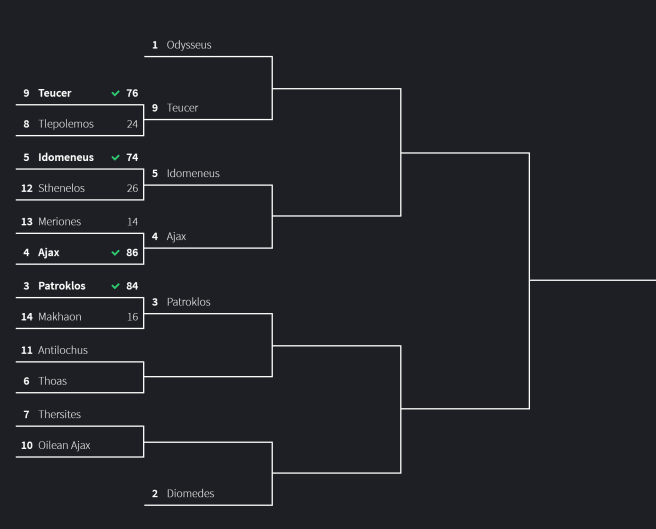Welcome to the second round of the #NANAIHB (the Non-Atreid, Non-Achilles Iliadic hero Bracket), the definitive tournament to decide who really is the second best of the Achaeans. The first round saw six contests, most of which were blowouts. The second round introduces four heroes who received first-round byes: Odysseus, Ajax, Patroklos, and Diomedes.


Round 2, Match 1: Odysseus vs. Teucer.
The Achaeans gathered and noticed that Odysseus was already seated in the competition grounds, looking off into the distance. When Teucer arrived, Odysseus stood up and said, “Welcome son of Telamon, pride of Salaminian land! I hail you as a friend and offer you my own bow as a sign of our guest-friendship.” Teucer squinted at the Ithakan king and said, “Odysseus, that would be a sign of enmity through theft, not friendship—your bow is much better than mine.” He stood to his side and spoke a few words to Ajax while Odysseus continued to stare.
When Nestor announced the contest’s beginning, Odysseus picked up his shield and a single spear. Teucer raised his bow and nocked an arrow. As he drew it back, the string broke, twanging off tune like a lyre string recoiling. Odysseus darted forward and slashed Teucer on the left army lightly, saying “Teucer, what should be done? The gods have made you unlucky!*”
Odysseus’ brother-in-law, Eurylochus, yelled, “Odysseus, that’s pretty harsh, even for you!” And Odysseus responded, winking at Ajax who was looming near Teucer, “Some ships are rowed without all their oars.” Teucer yielded.
* Odysseus toyed with Teucer’s name, saying, Ὤ Τεύκρε, τὶ τευκτόν εστί; οἱ σε θεοί δυστυχέα τεῦξαν! [ôh Teukre, ti teukton? Hoi se Theoi dustukhea teuksan!]

Today’s match, Idomeneus against Ajax.
Homer, Iliad 3.230-231
“That there is the monstrous bulwark of the Achaeans, Ajax.
Idomeneus stands on the other side like a god among the Cretans.”
οὗτος δ’ Αἴας ἐστὶ πελώριος ἕρκος ᾿Αχαιῶν·
᾿Ιδομενεὺς δ’ ἑτέρωθεν ἐνὶ Κρήτεσσι θεὸς ὣς
ἕστηκ’….

Telamonian Ajax is reportedly the “best of men while Achilles was raging” (ἀνδρῶν αὖ μέγ’ ἄριστος ἔην Τελαμώνιος Αἴας ὄφρ’ ᾿Αχιλεὺς μήνιεν, 2.768-769) and it would be fascinating to fully understand the difference between being “best of men” and “best of the Acheans”. He is the son of Telamon: in most accounts Peleus, Achilles’ father, and Telamon are brothers. Broader myth puts these cousins together frequently: there is a much repeated image of the two playing a game in armor; Ajax is frequently credited with carrying Achilles’ body out of the battle (as he does with Patroklos); and Ajax’s emotional appeal to Achilles in book nine is often seen as instrumental in keeping him from returning to Phthia.
Ajax came to Troy with 12 ships from Salamis and—according to the text of the Iliad we possess—lined them up with the Athenians (Αἴας δ’ ἐκ Σαλαμῖνος ἄγεν δυοκαίδεκα νῆας / στῆσε δ’ ἄγων ἵν’ ᾿Αθηναίων ἵσταντο φάλαγγες, 2.557-558; Carolyn Higbie has a great article about how this text may have been manipulated in antiquity). But he is known for his own bad self, and not his people. He is the monstrous bulwark of the Achaeans (οὗτος δ’ Αἴας ἐστὶ πελώριος ἕρκος ᾿Αχαιῶν, 3.239)
When Priam sees him from the gates, he describes him as “that other big and noble man / head and shoulders above the rest of the Argives.”τίς τὰρ ὅδ’ ἄλλος ᾿Αχαιὸς ἀνὴρ ἠΰς τε μέγας τε / ἔξοχος ᾿Αργείων κεφαλήν τε καὶ εὐρέας ὤμους; (3.226-227). His shield is as big as a tower! (Αἴας δ’ ἐγγύθεν ἦλθε φέρων σάκος ἠΰτε πύργον, 7.219). He’s brave (ἄλκιμος Αἴας), he’s shiny (φαίδιμος Αἴας), he’s really big (Τελαμώνιος Αἴας) and he walks big too (Αἴας…μάκρα βιβάσθων· 18.809).
#NANAIHB Round 2, Match 2, Clash of the Giants.
You can only choose one
— sententiae antiquae (@sentantiq) July 14, 2020
Idomeneus is also huge—if he weren’t Cretan and if Ajax weren’t there, this son of Minos just might be the second best of the Danaans. He devastated Sthenelos in round 1. He has held battalions of Trojans at bay.
How does he match up against Ajax? Helen places them right next to each other. And who is a better judge of a man than her?



















